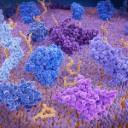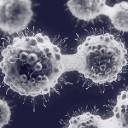-
Overcoming Lung Cancer Stigma With Understanding
Shirley Muñoz wants to use her experience as a younger lung cancer patient to break down barriers to care for her community through translation and advocacy.
by Cameron Walker
-
Genetic Testing Gaps
Testing for hereditary mutations is increasingly recommended for people with cancer, but recommendations do not always translate into access to testing and appropriate counseling.
by Kate Yandell
-
Patient Advocates Tune in for Precision Medicine Primer
Scientists and physicians discussed advances in targeted therapies and immunotherapies, as well as the lessons COVID-19 research has taught to cancer researchers.
by Kevin McLaughlin
-
Immunotherapy Options for Breast Cancer
Two immune checkpoint inhibitors are now approved for treatment of some people with advanced breast cancer, but trial results have raised some questions.
by Anna Goshua
-
Liquid Biopsies May Ease Enrollment in Clinical Trials
A study shows that a blood test for gastrointestinal tumor mutations gave results in a third of the time needed for solid tissue testing. Patients who received the blood test were more likely to enroll in clinical trials.
by Emma Yasinski
-
What Is Tumor Mutational Burden?
The Food and Drug Administration approved an immunotherapy drug for tumors with high tumor mutational burden regardless of tumor type. But some medical oncologists say it's not clear the biomarker is valid across all cancer types.
by Anna Azvolinsky
-
Tumor Testing May Help Guide Pancreatic Cancer Treatment
For a small group of pancreatic cancer patients who were able to receive therapies targeting the molecular alterations in their tumors, these matched therapies were associated with longer life.
by Cheryl Platzman Weinstock
-
Medicare Coverage for Next-Generation Sequencing Tests
Multigene panels that rely on next-generation sequencing are increasingly used to test for hereditary cancer risk-related mutations. The federal government aims to expand Medicare coverage for these tests.
by Ashley P. Taylor
-
New Drugs for an Elusive Cancer Target
Medical oncologist and lung cancer expert Roy S. Herbst discusses early data on drugs that target a mutated form of the KRAS protein.
by Anna Azvolinsky
-
Misunderstandings About Cancer DNA Tests
Many cancer patients who received genomic testing of their cancers in a clinical trial did not fully understand the purpose of the testing.
by Emma Yasinski
Cancer Talk
Lessons From 20 Years Living With Cancer
Multiple myeloma survivor Jonathan Gluck reflects on uncertainty, and the scientific progress that has kept him living with cancer for more than two decades.
by Eric Fitzsimmons
The Enduring Importance of Cancer Disparities ResearchOpening session from AACR conference highlights how perseverance and adversity have informed cancer disparities research over the years.
by Eric Fitzsimmons
Most Cancer Survivors Don’t Meet Healthy Diet GoalsDespite research linking fruits and vegetables to cancer survival, many people do not change their eating habits after diagnosis.
by Darlene Dobkowski
Many People Don’t Get Colonoscopy After Receiving Abnormal Blood TestsAbout half of people who receive abnormal results from colorectal cancer screening tests don’t follow up with a colonoscopy.
by Laura Gesualdi Gilmore














